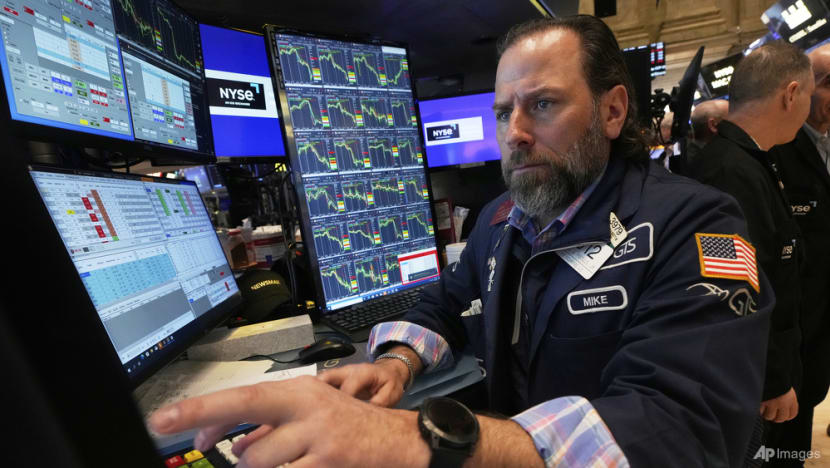US stocks plunge, suffer biggest losses since COVID-19 crash amid escalating trade war
The Dow Jones Industrial Average, S&P 500 and Nasdaq Composite posted their largest two-day declines since the COVID-19 panic in 2020.

Specialist Michael Pistillo works on the floor of the New York Stock Exchange, Friday, Apr 4, 2025. (Photo: AP/Richard Drew)
NEW YORK: Wall Street nosedived for a second straight day on Friday (Apr 4), after China said it would strike back at US President Donald Trump with additional tariffs of 34 per cent on American goods, escalating a trade war that has rattled investors and fed fears of a coming recession.
The Dow Jones Industrial Average, S&P 500 and Nasdaq Composite posted their largest two-day declines since the emerging COVID-19 pandemic in 2020 caused global panic during US President Donald Trump's first term.
The broad-based S&P 500 shed 6 per cent for the day and more than 10 per cent over the last couple of days, sending the index's market cap plunging US$5 trillion in just two days.
For Thursday and Friday, the Dow was down 9.3 per cent and the Nasdaq 11.4 per cent.
Fallout from Trump's sweeping tariffs stoked fears of a global recession, wiping trillions of dollars of value from US companies. Highlighting growing panic among investors, the CBOE Volatility Index, or Wall Street's fear gauge, closed at its highest level since April 2020.
Investment bank JP Morgan estimated a 60 per cent chance of the global economy entering a recession by year-end, up from 40 per cent previously.
"This is significant and is unlikely to be over, hence the negative market reactions," said Stephane Ekolo, Market & Equity Strategist, Tradition, London. "Investors are afraid of a 'tit for tat' trade war situation."
Highlighting growing panic among investors, the CBOE Volatility Index, or Wall Street's fear gauge, closed at its highest level since April 2020.
Global governments began reacting to Trump's tariff announcement on Friday, further undermining investor sentiment that a global recession could be averted.
"We're in the Wild West of a trade war right now," said Mariam Adams, managing director at UBS Wealth Management.
The Nasdaq's slide on Friday confirmed a bear market for the tech-heavy index, compared to its record closing high of 20,173.89 on Dec 16. Meanwhile, the Dow Jones Industrial Average confirmed a correction to its record closing high of 45,014.04 on Dec 4.
The S&P 500 lost 322.44 points, or 5.97 per cent, to close at 5,074.08 points, its lowest finish in 11 months.
"Right now, how bad it gets depends on how committed the administration is to this set of policies which, clearly, the market is voting against," said Steve Sosnick, chief strategist at Interactive Brokers.
"MY POLICIES WILL NEVER CHANGE"
As the market selloff intensified, Trump was largely out of public view at his golf course, where he sent multiple defiant social media messages guaranteeing victory for the US economy.
"To the many investors coming into the United States and investing massive amounts of money, my policies will never change. This is a great time to get rich, richer than ever before!!!" Trump said in a social media post in all caps.
After Beijing's retaliation, he posted: "China played it wrong, they panicked - the one thing they cannot afford to do!"
Trump's team has characterised the market turbulence as an adjustment that would prove beneficial in the long run.
Federal Reserve Chair Jerome Powell spoke publicly for the first time since Trump's tariff announcement, telling business journalists at a conference on Friday that the tariffs were "larger than expected" and elevated the risk of both higher inflation and slower growth.
The Fed can wait for more data to decide how monetary policy should respond, but it will focus on keeping inflation expectations anchored if Trump's tariffs sparked more persistent price pressures, Powell said.
He did not directly address the US stock selloff but acknowledged that uncertainty had paused business decisions.
"People are just, they just are kind of waiting for clarity," Powell said. "I can't tell you when that will pass, but you know, ultimately it will pass."
Safe-haven buying in the bond market sent the yield on the benchmark 10-year Treasury notes to below 4 per cent.
This pushed US bank stocks down further, with the sector under pressure globally, as the prospect of interest rate cuts from central banks and a hit to economic growth from tariffs would crimp profitability. The S&P Banks index dropped 7.3 per cent.
US-listed shares of Chinese companies dived, with JD.com and Alibaba and Baidu all down more than 7.7 per cent.
Companies with exposure to China also fell across the board, with mega-caps such as Apple dropping 7.3 per cent.
The chipmakers index sank 7.6 per cent, having declined 9.9 per cent the previous day. The sector is particularly vulnerable to a double tariff whammy as many chip companies design their chips in the US but have them manufactured in China.

















